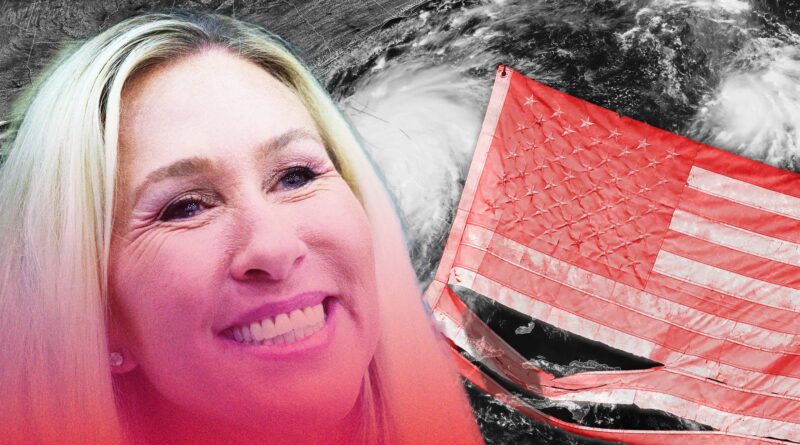Misinformation About Climate Change Harms Those Most in Need
In the span of two weeks, Florida has endured two major hurricanes. Both storms began in the Gulf and brought serious rain and winds, stronger than in previous years. Over the past few months, there have been stories highlighting the insurance crisis gripping Florida’s homeowners, the need for the Sunshine state to prioritize climate resilience, and how Tropical Storm Debby showed Floridians storms are increasing in severity as a result of climate change. Yet, despite researchers pointing the finger at climate impacts creating conditions that worsened these storms, some people still refuse to acknowledge the existence of climate change.
This denial has reached an alarming apex. Climate denialism must not be treated like a fringe issue; it’s a mainstream political position, especially among Trump loyalists of the Republican Party.
For example, despite repeated false claims that climate change is not man made, Georgia Congresswoman Marjorie Taylor Greene recently promoted baseless conspiracy theories suggesting that mysterious forces are controlling the weather, targeting Republican areas to sway elections. (Sorry, MTG, either climate change is caused by humans or it’s not.) These outlandish claims have been amplified by former President Donald Trump. The Republican presidential nominee has peddled his own conspiracy theories, including the false claim that disaster relief funds are being diverted to assist migrants. In the process, he’s demonized the FEMA workers who put their lives on the line to help those Americans in need. It’s shameless.
When elected officials and other people of authority with a platform spread misinformation, they sow dangerous skepticism in the American public, eroding trust in experts and institutions. After Hurricane Helene, veteran meteorologist John Morales noted that “something’s shifted, and it’s not just the climate.” As he tried to warn the public about Helene, a career-long practice for him, he was accused of being a “climate militant,” with some dismissing his forecasts as exaggerations.
Moreover, the politicization of climate change by politicians exacerbates the divide between scientific consensus and public opinion. By framing climate events as political conspiracies instead of natural phenomena intensified by human activity, they mislead their constituents and risk public safety.
Misinformation harms those most in need, as we have seen in hurricane victims refusing FEMA assistance. This distrust in government institutions and scientific expertise is eroding our collective ability to respond effectively to natural disasters. As long as figures like Greene and Trump are allowed to dominate the discourse with baseless claims and conspiracy theories, trust in the systems designed to protect us will continue to erode.
The experience of veteran meteorologist John Morales highlights another troubling aspect of this trend: the deepening hostility toward scientific expertise. When seasoned professionals are accused of fear-mongering for simply doing their job, it creates an environment where vital information may be disregarded, leading to inadequate preparation for severe weather events. As seen by people refusing to evacuate ahead of Hurricane Milton.
The consequences of this rhetoric are painfully clear. In the aftermath of Hurricane Helene and Milton, communities are facing not only the physical devastation of the storms but the psychological toll of widespread misinformation. Instead of relying on well-established systems for disaster recovery, like FEMA, some are choosing to go it alone, misled by conspiracies which further erode public trust in government institutions. The irony here is stark: as climate change intensifies and the need for collective action grows more urgent, the very tools designed to help us mitigate its effects are being rejected.
Originally written for and published on The Invading Sea.

